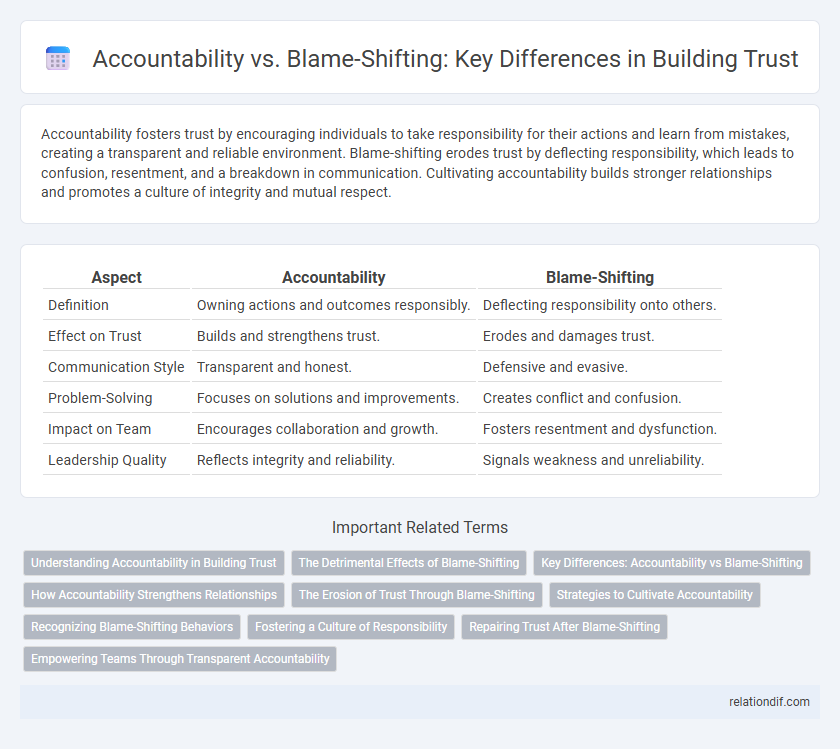Accountability fosters trust by encouraging individuals to take responsibility for their actions and learn from mistakes, creating a transparent and reliable environment. Blame-shifting erodes trust by deflecting responsibility, which leads to confusion, resentment, and a breakdown in communication. Cultivating accountability builds stronger relationships and promotes a culture of integrity and mutual respect.
Table of Comparison
| Aspect | Accountability | Blame-Shifting |
|---|---|---|
| Definition | Owning actions and outcomes responsibly. | Deflecting responsibility onto others. |
| Effect on Trust | Builds and strengthens trust. | Erodes and damages trust. |
| Communication Style | Transparent and honest. | Defensive and evasive. |
| Problem-Solving | Focuses on solutions and improvements. | Creates conflict and confusion. |
| Impact on Team | Encourages collaboration and growth. | Fosters resentment and dysfunction. |
| Leadership Quality | Reflects integrity and reliability. | Signals weakness and unreliability. |
Understanding Accountability in Building Trust
Understanding accountability is essential for building trust, as it involves taking responsibility for actions and decisions without deflecting blame. When leaders and team members consistently demonstrate accountability, they foster an environment of reliability and transparency. This commitment to ownership strengthens relationships and encourages open communication, which are critical components of trust.
The Detrimental Effects of Blame-Shifting
Blame-shifting undermines trust by eroding transparency and obstructing effective problem-solving within teams. It fosters a toxic environment where accountability is avoided, leading to decreased morale and diminished collaboration. Persistent blame-shifting damages organizational culture, resulting in lower productivity and increased employee turnover.
Key Differences: Accountability vs Blame-Shifting
Accountability involves taking responsibility for one's actions and their outcomes, fostering trust and open communication within teams. Blame-shifting occurs when individuals deflect responsibility onto others, damaging relationships and undermining organizational integrity. Key differences include accountability promoting problem-solving and growth, while blame-shifting leads to mistrust and repeated mistakes.
How Accountability Strengthens Relationships
Accountability fosters trust by encouraging transparency, reliability, and growth within relationships. When individuals take responsibility for their actions, it promotes open communication and mutual respect, reducing conflicts and misunderstandings. This commitment to accountability strengthens bonds by creating a safe environment where mistakes are addressed constructively rather than punished through blame-shifting.
The Erosion of Trust Through Blame-Shifting
Blame-shifting directly undermines accountability by deflecting responsibility and creating a toxic environment of mistrust within teams or organizations. When individuals avoid owning their mistakes, it erodes collaborative trust and diminishes overall morale. Effective accountability fosters transparency and reliability, essential components for maintaining strong, trust-based relationships.
Strategies to Cultivate Accountability
Effective strategies to cultivate accountability include setting clear expectations, fostering open communication, and encouraging ownership of tasks and outcomes. Implementing regular feedback loops and transparent performance metrics helps individuals recognize their responsibilities without resorting to blame-shifting. Building a culture that rewards problem-solving and learning from mistakes strengthens trust and promotes genuine accountability across teams.
Recognizing Blame-Shifting Behaviors
Recognizing blame-shifting behaviors involves identifying patterns where individuals evade responsibility by redirecting fault onto others, often through deflective language or minimizing their role in the issue. Such behaviors undermine trust and hinder accountability by creating a culture of fear and mistrust. Effective accountability requires clear acknowledgment of one's actions and their impact, fostering transparency and reliability within teams.
Fostering a Culture of Responsibility
Fostering a culture of responsibility enhances trust by encouraging individuals to own their actions and learn from mistakes rather than shifting blame. Organizations with clear accountability frameworks experience higher employee engagement, improved problem-solving, and stronger collaboration. Emphasizing transparency and constructive feedback reinforces behavioral standards that build long-term trust within teams.
Repairing Trust After Blame-Shifting
Repairing trust after blame-shifting requires transparent communication and a commitment to taking responsibility for mistakes. Implementing consistent actions that demonstrate accountability rebuilds damaged relationships and fosters a culture of reliability. Trust restoration is strengthened by acknowledging errors openly and working collaboratively to prevent recurrence.
Empowering Teams Through Transparent Accountability
Transparent accountability fosters a culture where team members take ownership of their responsibilities, enhancing trust and collaboration within the organization. Empowering teams through clear expectations and open communication reduces blame-shifting, allowing for constructive problem-solving and continuous improvement. Emphasizing accountability over blame encourages a growth mindset and drives collective success.
Accountability vs Blame-Shifting Infographic

 relationdif.com
relationdif.com